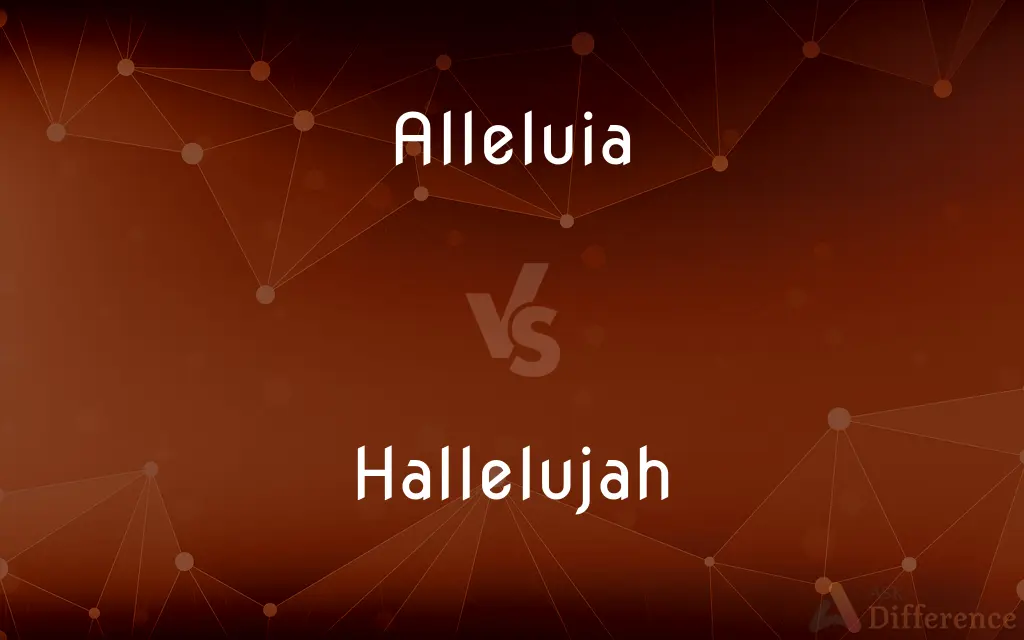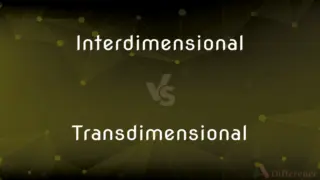Alleluia vs. Hallelujah — What's the Difference?
By Tayyaba Rehman — Updated on August 20, 2023
"Alleluia" and "Hallelujah" both mean "praise the Lord," but "Alleluia" is typically used in Christian liturgical contexts while "Hallelujah" is a broader, more popular expression of praise.

Difference Between Alleluia and Hallelujah
Table of Contents
ADVERTISEMENT
Key Differences
"Alleluia" and "Hallelujah" are terms that are often heard in religious contexts, both evoking a sense of joy and praise. At their core, both words essentially mean "Praise the Lord." While their meanings are similar, their usages and connotations differ based on tradition and culture.
"Alleluia" is predominantly associated with Christian liturgy, particularly in Catholic, Anglican, and Eastern Orthodox traditions. When one attends a liturgical service, it's more common to hear "Alleluia" being sung or chanted before the reading of the Gospel. "Hallelujah," on the other hand, is a more universal term that spans multiple religious traditions, including Christianity and Judaism.
The origin of both words can be traced back to Hebrew. "Hallelujah" is derived from two Hebrew words: "Hallelu," which means "to praise joyfully," and "Yah," a shortened form of the name of God, Yahweh. "Alleluia" is the Latinized form of "Hallelujah" and has been used in Christian worship for centuries.
In popular culture, "Hallelujah" has found its place in numerous songs, movies, and books, often used to convey a sense of rejoicing or thanksgiving. "Alleluia," while still recognized outside of religious contexts, retains a more sacred, liturgical association.
Comparison Chart
Origin
Latinized form of Hebrew
Directly from Hebrew
ADVERTISEMENT
Primary Association
Christian Liturgy
Christianity and Judaism
Cultural Usage
More liturgical
More widespread
Syntactic Usage
Often before Gospel
General praise
Popularity in Media
Less common
More common
Compare with Definitions
Alleluia
An expression of joy or thankfulness in Christian contexts.
She whispered an alleluia as the rain began to fall after a long drought.
Hallelujah
An expression of relief or gratitude.
When the test was postponed, a hallelujah passed through the classroom.
Alleluia
A word symbolizing rejoice in Christian ceremonies.
The alleluia was raised high during the Easter Vigil.
Hallelujah
Hallelujah ( HAL-i-LOO-yə) is an interjection used as an expression of gratitude and adoration. It is a transliteration of the Hebrew phrase הַלְלוּ יָהּ (Modern Hebrew hallūyāh, Tiberian haləlūyāh), which means to praise Jah (from הַלְלוּ, "praise;" and יָהּ, Jah.) The word hallel in Hebrew means a joyous praise in song.
Alleluia
A term used to acknowledge the presence of the divine.
The congregation stood, ready to proclaim the alleluia.
Hallelujah
(music) A song of praise to God; a musical composition based on the word "Hallelujah".
Alleluia
Alleluia refers to a liturgical chant in which that word is combined with verses of scripture, usually from the Psalms. This chant is commonly used before the proclamation of the Gospel.
Hallelujah
(intransitive) To cry "hallelujah" in praise.
Alleluia
A liturgical chant expressing joy and praise.
The choir sang the alleluia before the Gospel reading.
Hallelujah
A term used in both Jewish and Christian worship to express praise.
The congregation sang hallelujah during the festive season.
Alleluia
Hallelujah.
Hallelujah
(in the plural) General praise.
Alleluia
An exclamation used in Christian hymns of joy.
The alleluia echoed throughout the cathedral's grand halls.
Hallelujah
A shout or song of praise to God
Alleluia
(music) A choral composition incorporating alleluia in its text.
Hallelujah
A word symbolizing gratitude in spiritual contexts.
At the end of the challenging journey, her heart whispered a silent hallelujah.
Alleluia
The plant wood sorrel.
Hallelujah
Used to express praise or joy.
Alleluia
A liturgical or variant form of hallelujah.
Hallelujah
A universal declaration of thanks or celebration.
Hallelujah! he exclaimed as he found his lost wedding ring.
Alleluia
A liturgical form of hallelujah.
Hallelujah
(Music) A composition expressing praise and based on the word "hallelujah."
Alleluia
An exclamation signifying Praise ye Jehovah. Hence: A song of praise to God. See Hallelujah, the commoner form.
I heard a great voice of much people in heaven, saying, Alleluia.
Hallelujah
(by extension) A general expression of gratitude or adoration.
Hallelujah! It’s finally the weekend!
Alleluia
Alternative spelling of hallelujah
Hallelujah
A shout of joy or praise to God.
As they reached the mountaintop, a spontaneous hallelujah erupted from the group.
Hallelujah
An exclamation of "hallelujah."
Hallelujah
A shout of “Hallelujah”.
Common Curiosities
What do alleluia and hallelujah mean?
Both "Alleluia" and "Hallelujah" mean "Praise the Lord" and are expressions of joy and thanksgiving.
Why do songs and movies commonly use hallelujah?
"Hallelujah" is more universally recognized and conveys a broad sense of joy and praise, making it popular in various forms of media.
Are alleluia and hallelujah interchangeable?
While they have similar meanings, "Alleluia" is more associated with Christian liturgy, while "Hallelujah" has broader religious and cultural connotations.
What is the origin of alleluia and hallelujah?
Both words have roots in Hebrew, with "Hallelujah" directly derived and "Alleluia" being the Latinized version.
Which word is older, alleluia or hallelujah?
"Hallelujah" from the Hebrew is older, and "Alleluia" is its Latinized form adopted later in Christian worship.
In which religions are the terms alleluia and hallelujah used?
"Alleluia" is mainly used in Christian contexts, while "Hallelujah" is recognized in both Christianity and Judaism.
Can hallelujah be used outside religious contexts?
Yes, "Hallelujah" has a broader cultural usage and can be an expression of joy, relief, or gratitude in secular contexts.
Is there a specific season in Christianity when alleluia is avoided?
Yes, during Lent, many Christian denominations avoid or limit the use of "Alleluia" to mark the solemnity of the season.
Which word is more commonly used in popular culture?
"Hallelujah" is more commonly used in popular culture, appearing in songs, movies, and literature.
Do alleluia and hallelujah appear in the Bible?
Yes, variations of "Hallelujah" appear in the Hebrew Bible and Christian Old Testament, while "Alleluia" appears in the Christian New Testament, especially in the Book of Revelation.
Share Your Discovery

Previous Comparison
Awardee vs. Award
Next Comparison
Interdimensional vs. TransdimensionalAuthor Spotlight
Written by
Tayyaba RehmanTayyaba Rehman is a distinguished writer, currently serving as a primary contributor to askdifference.com. As a researcher in semantics and etymology, Tayyaba's passion for the complexity of languages and their distinctions has found a perfect home on the platform. Tayyaba delves into the intricacies of language, distinguishing between commonly confused words and phrases, thereby providing clarity for readers worldwide.














































